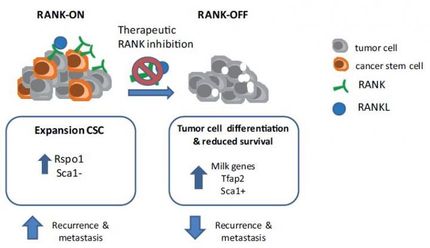An apple peel a day might keep cancer at bay, Cornell food science study finds
Advertisement
An apple a day keeps the doctor away? Or, what appears to be more accurate: An apple peel a day might help keep cancer at bay, according to a new Cornell study. Cornell researchers have identified a dozen compounds - triterpenoids - in apple peel that either inhibit or kill cancer cells in laboratory cultures. Three of the compounds have not previously been described in the literature.
"We found that several compounds have potent anti-proliferative activities against human liver, colon and breast cancer cells and may be partially responsible for the anti-cancer activities of whole apples," says Rui Hai Liu, Cornell associate professor of food science. Liu is affiliated with Cornell's Institute of Comparative and Environmental Toxicology and is senior author of the study, which is published in the Journal of Agricultural and Food Chemistry.
In previous Cornell studies, apples had been found not only to fight cancer cells in the laboratory but also to reduce the number and size of mammary tumors in rats. The Cornell researchers now think that the triterpenoids may be doing much of the anti-cancer work. "Some compounds were more potent and acted differently against the various cancer cell lines, but they all show very potent anti-cancer activities and should be studied further," said Liu.
With co-author Xiangjiu He, a Cornell postdoctoral researcher, Liu analyzed the peel from 230 pounds of red delicious apples from the Cornell Orchard and isolated their individual compounds. After identifying the structures of the promising compounds in the peel, the researchers tested the pure compounds against cancer cell growth in the laboratory. In the past, Liu has also identified compounds called phytochemicals - mainly flavonoids and phenolic acids - in apples and other foods that appear to be have anti-cancer properties as well, including inhibiting tumor growth in human breast cancer cells.
Most read news
Topics
Organizations
Other news from the department science

Get the life science industry in your inbox
By submitting this form you agree that LUMITOS AG will send you the newsletter(s) selected above by email. Your data will not be passed on to third parties. Your data will be stored and processed in accordance with our data protection regulations. LUMITOS may contact you by email for the purpose of advertising or market and opinion surveys. You can revoke your consent at any time without giving reasons to LUMITOS AG, Ernst-Augustin-Str. 2, 12489 Berlin, Germany or by e-mail at revoke@lumitos.com with effect for the future. In addition, each email contains a link to unsubscribe from the corresponding newsletter.


























































